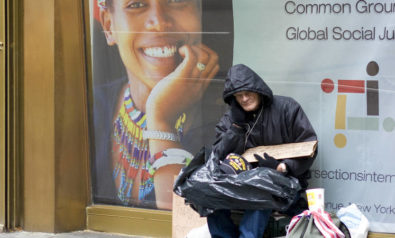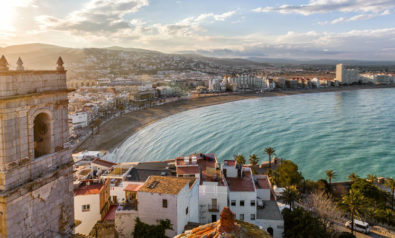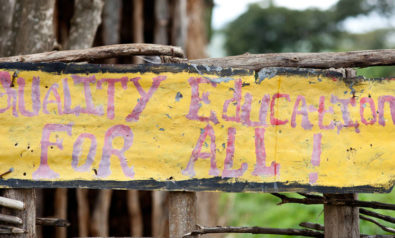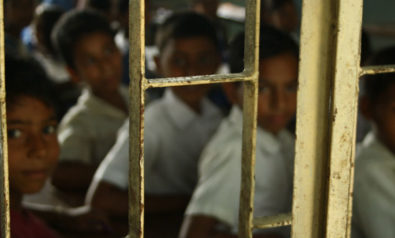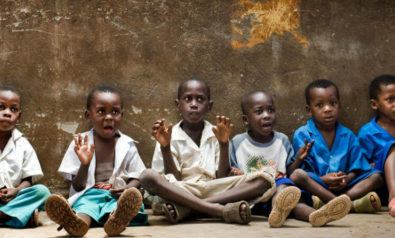Much of the policy discourse on migration continues to harp on its destabilizing effects without recognizing its transformative potential for the poor.
Migration has been a recurring phenomenon throughout human history. Since time immemorial, man has perpetually been on the move in search of greener pastures and greater opportunities. These migratory movements have been a potent force in shaping the cultural landscape and political configuration in much of the modern world. Had it not been for migrant labor, some of the world’s greatest metropolitan cities would probably not have taken shape. There would have been no London, New York, Tokyo, Beijing or Mumbai.
Yet migration continues to be viewed as an essentially destabilizing process, which probably explains why it has been so conspicuous by its absence from much of the current development discourse. At a moment when the world is grappling with the worst migration crisis since the Second World War, it becomes all the more necessary to understand the forces that drive migration and its contested relationship with poverty, growth and citizenship rights.
International vs. Internal Migration
The UN defines migration as an act of crossing the boundary of a political or administrative unit for a certain minimum period of time. It may be undertaken by refugees, displaced persons and those seeking employment. International migration, which involves people crossing national borders, has received a disproportionate share of policy attention worldwide, and this is particularly true for migratory streams flowing from poor developing countries to the rich countries of Europe, North America and Oceania.
In reality, the bulk of the migratory movements occur not between countries, but within them. Take the case of India—the second most populous country in the world. India has some 400 million internal migrants who account for nearly 30% of its total population. Compare this with estimates of India’s emigrants, who number over 11 million. Many of these migrants are not permanent settlers. They often migrate seasonally, sometimes even for a few weeks during the lean agricultural season, returning to their native places thereafter.
These kinds of short-term migratory movements are typically undertaken by poorer social groups, having low educational attainments and poor skill sets. It is this “floating segment” of the migrant population that often goes undetected in official surveys. It is also the most vulnerable to exploitation by labor contractors, middlemen and locally influential state officials, and the least likely to be protected by legislation.
Migration, Poverty and Growth
Migration has been widely been recognized as an effective strategy of poverty reduction, particularly in developing countries. Remittances from migration can have a transformative impact on the economies of sending areas. These remittances, if channeled into productive income-generating activities, can significantly bolster household incomes and reduce the incidence of poverty.
Nevertheless, it would be misleading to suggest that migration has a benign impact on poverty reduction. Migration outcomes are contingent on a number of factors that include the social location of the migrating groups and the circumstances in which migration is undertaken. Migration may not be as rewarding an experience for the ultra-poor as it is for the relatively better off social groups. This is because it involves significant transaction costs which can only be borne by those who command some resources like land, livestock and social capital. The same can be said about people who become refugees, owing to protracted ethnic conflict, civil wars and development projects that often cause large-scale displacement.
Why should a democracy, in principle, privilege some voters over others, when they are de facto citizens of the same country, governed by the same set of laws?
However, migration can also be a voluntaristic enterprise, howsoever problematic the term “voluntary” is. Voluntary migration is often undertaken in search of better wages, better employment prospects and better access to education and health care facilities. Much of the policy discourse on migration continues to harp on its destabilizing effects, virtually neglecting the well-documented cases of how accumulative migration has helped improve the lives of poor communities, who otherwise would have few alternatives to fall back on when work opportunities in the farm sector are scarce or unavailable.
Migration and Citizenship Rights
There is a growing body of evidence that reveals how migrants across the world face barriers while trying to access the most basic human rights. They lack access to adequate housing and sanitation, are typically engaged in low-paid, hazardous work and mostly excluded from the ambit of social protection programs and public services.
In some parts of the world, migrants are practically reduced to second-class citizens, with their passports taken by their employers. Many of them often face harassment at the hands of local authorities. In multi-ethnic societies like India, political parties have spearheaded sons-of-the-soil movements against immigrant populations, unleashing a reign of xenophobic violence on them. Similar cases of xenophobia have lately been reported from South Africa and many countries in Europe, in the wake of mass migrations from war-torn countries of the Middle East and North Africa.
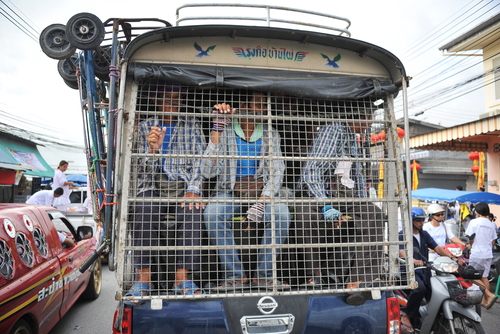
PHUKET TOWN, THAILAND © Shutterstock
As more and more migrants land on the shores of Europe, tensions between immigrants and locals are likely to grow. The larger challenge for Europe and the rest of the world is not to contain or discourage migration, but to facilitate the integration of these migrants into mainstream society. So far as internal migrants are concerned, governments need to think of suitable ways to facilitate their participation in electoral politics. There are tens of thousands of people in India who cannot exercise their right to vote due to the hostility of regional political parties and rigid administrative rules. Living on the porous frontiers of legality and illegality, these migrants lose out on that one opportunity to cast their ballots, since the country’s laws do not permit a citizen to vote from a place other than where he or she is an “ordinarily resident.”
An exception to this rule has been made for those who are compelled to remain at a place other than their place of ordinary residence, owing to the compulsions of the public office held by them in public interest. Legislative efforts are made to extend voting rights to non-resident Indians (NRIs) as well, who alone number some 16 million as per a latest UN survey on international migrant trends.
The question that begs an explanation here is: Why should a democracy, in principle, privilege some voters over others, when they are de facto citizens of the same country, governed by the same set of laws? To say that migrants, being private persons, make a lesser contribution to a nation’s development than its service personnel or diaspora is to deny the role internal migrants have historically played in making and remaking our cities into engines of economic advancement and centres of cultural syncretism.
As developing countries like India become more urbanized and their populations more mobile, migration is likely to occur on a much larger scale that it is happening at present. Instead of shying away from addressing the concerns of this floating population on grounds of administrative inconvenience, governments and policymakers would do well to make special arrangements for them to exercise their right to vote in elections in either their place of origin or destination. This would not only help them articulate their specific interests and concerns better, but would also restore their status as citizens possessing a sense of agency to lead the kind of lives they have reason to value.
The views expressed in this article are the author’s own and do not necessarily reflect Fair Observer’s editorial policy.
Photo Credit: lumokajlinioj / Shutterstock.com
 We bring you perspectives from around the world. Help us to inform and educate. Your donation is tax-deductible. Join over 400 people to become a donor or you could choose to be a sponsor.
We bring you perspectives from around the world. Help us to inform and educate. Your donation is tax-deductible. Join over 400 people to become a donor or you could choose to be a sponsor.
Support Fair Observer
We rely on your support for our independence, diversity and quality.
For more than 10 years, Fair Observer has been free, fair and independent. No billionaire owns us, no advertisers control us. We are a reader-supported nonprofit. Unlike many other publications, we keep our content free for readers regardless of where they live or whether they can afford to pay. We have no paywalls and no ads.
In the post-truth era of fake news, echo chambers and filter bubbles, we publish a plurality of perspectives from around the world. Anyone can publish with us, but everyone goes through a rigorous editorial process. So, you get fact-checked, well-reasoned content instead of noise.
We publish 2,500+ voices from 90+ countries. We also conduct education and training programs
on subjects ranging from digital media and journalism to writing and critical thinking. This
doesn’t come cheap. Servers, editors, trainers and web developers cost
money.
Please consider supporting us on a regular basis as a recurring donor or a
sustaining member.
Will you support FO’s journalism?
We rely on your support for our independence, diversity and quality.



